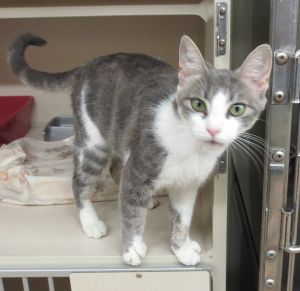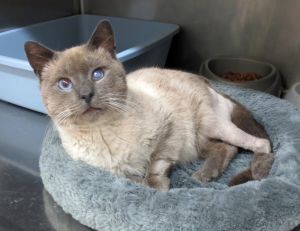 Photo: Flea, an adult spayed female Terrier mix who has been at BCHS over a year.
Photo: Flea, an adult spayed female Terrier mix who has been at BCHS over a year.
Each summer animal shelters across the country are stressed to the limit with many dogs and cats entering their doors. The Bradford County Humane Society has been close to or at full capacity already this season. "Nearly every animal that comes into our shelter is a stray. The summer months can be extremely busy with more than normal dogs and cats being brought to BCHS," states Jennifer L. Spencer, BCHS Executive Director. "I always urge those that have lost their pet to please contact us first - their dog could have gotten loose and ended up being picked up by the dog warden and brought to BCHS," she adds.
 Photo: Macho, an adult neutered male Rottweiler who has been at BCHS since December.
Photo: Macho, an adult neutered male Rottweiler who has been at BCHS since December.
BCHS does not euthanize for space, therefore when they are at full capacity they work with local animal shelters to assist by taking some of their dogs to their facilities to be placed for adoption. Local rescues are also contacted for specific breeds or even special needs animals.
Because overpopulation of pets is an issue in nearly every community, spaying and neutering your animal is of the utmost importance.
Many well-intentioned pet owners still find making the choice to spay or neuter their pet a difficult one. This is largely due to the many misconceptions associated with this very basic surgery. However the reality is pets that are spayed or neutered typically live much longer, healthier, and happier lives and are also helping to solve the serious problem of pet overpopulation. For these reasons, and many more, nearly all animals adopted from BCHS have already been spayed or neutered. However, you may have a pet at home or have a friend with a dog or cat that has not yet had this simple surgery. Here are some of the reasons that spaying or neutering is one of the best things you can do for your pet, yourself, and your community:
Making the decision to spay or neuter your pet means fewer pets—pets as sweet, loving, healthy, and deserving of companionship as your own end up in animal shelters every day.
The Humane Society of the United States explains some commonly spread myths about spaying and neutering below:
MYTH: It's better to have one litter before spaying a female pet.
FACT: Every litter counts.
Medical evidence indicates just the opposite. In fact, the evidence shows that females spayed before their first heat are typically healthier. Many veterinarians now sterilize dogs and cats as young as eight weeks of age. Check with your veterinarian about the appropriate time for these procedures.
MYTH: But my pet is a purebred.
FACT: So is at least one out of every four pets brought to animal shelters around the country. There are just too many dogs and cats—mixed breed and purebred.
MYTH: I want my dog to be protective.
FACT: It is a dog's natural instinct to protect home and family. A dog's personality is formed more by genetics and environment than by sex hormones.
MYTH: I don't want my male dog or cat to feel like less of a male.
FACT: Pets don't have any concept of sexual identity or ego. Neutering will not change a pet's basic personality. He doesn't suffer any kind of emotional reaction or identity crisis when neutered.
MYTH: My pet will get fat and lazy.
FACT: The truth is that most pets get fat and lazy because their owners feed them too much and don't give them enough exercise.
MYTH: But my dog (or cat) is so special, I want a puppy (or kitten) just like her.
FACT: Your pet's puppies or kittens have an unlikely chance of being a carbon copy of your pet. Even professional breeders cannot make this guarantee. There are shelter pets waiting for homes who are just as cute, smart, sweet, and loving as your own.
MYTH: It's expensive to have my pet spayed or neutered.
FACT: Many low-cost options exist for spay/neuter services. Most regions of the U.S. have at least one spay/neuter clinic within driving distance that charge $100 or less for the procedure. Low-cost spay/neuter is more and more widely available all the time.
MYTH: I'll find good homes for all the puppies and kittens.
FACT: You may find homes for your pet's puppies and kittens. But you can only control what decisions you make with your own pet, not the decisions other people make with theirs. Your pet’s puppies and kittens, or their puppies or kittens, could end up in an animal shelter, as one of the many homeless pets in every community competing for a home.
If you have been thinking of getting a dog or cat, puppy or kitten, stop in to the shelter on Route 220. "We have so many nice animals just waiting for their forever home," states Spencer.
Also for the month of August any cat that has been spayed or neutered is only $25 to adopt.
 Many animal shelters are located in less heavily traveled or accessed areas of a community. This presents impediments to introducing loving adoptable animals to lots and lots of prospective pet parents. Through a unique partnership with Petco Animal Supplies and select animal welfare groups, Petco has created satellite animal shelter locations within local Petco stores. These mini-shelters are open whenever Petco is open and provide access to cats by a very desirable demographic of potential animal adopters. In 2012 alone, these mini-shelters yielded new homes for 3,492 pets.
Many animal shelters are located in less heavily traveled or accessed areas of a community. This presents impediments to introducing loving adoptable animals to lots and lots of prospective pet parents. Through a unique partnership with Petco Animal Supplies and select animal welfare groups, Petco has created satellite animal shelter locations within local Petco stores. These mini-shelters are open whenever Petco is open and provide access to cats by a very desirable demographic of potential animal adopters. In 2012 alone, these mini-shelters yielded new homes for 3,492 pets.

 Currently Kay (above left), a spayed female cat that is extremely friendly and Wheeley (above right), a spayed female cat who is also looking for a nice lap to nap on are being housed at the Petco in Big Flats.
Currently Kay (above left), a spayed female cat that is extremely friendly and Wheeley (above right), a spayed female cat who is also looking for a nice lap to nap on are being housed at the Petco in Big Flats.
 “Our community is very supportive of our animal shelters. This event will be a chance for our supporters to enjoy an evening out while supporting our shelter animals at the same time,”states Jennifer L. Spencer, BCHS Executive Director.
“Our community is very supportive of our animal shelters. This event will be a chance for our supporters to enjoy an evening out while supporting our shelter animals at the same time,”states Jennifer L. Spencer, BCHS Executive Director.
 Ziggy, waiting for her forever home, invites you to join her and her furry friends for the Xmas party!
Ziggy, waiting for her forever home, invites you to join her and her furry friends for the Xmas party!
 In the meantime, you can always see our pet list by going to
In the meantime, you can always see our pet list by going to 
 The National Pit Bull Awareness campaign is a nationwide effort to bring positive awareness and attention to the American Pit Bull Terrier and their responsible owners.
The National Pit Bull Awareness campaign is a nationwide effort to bring positive awareness and attention to the American Pit Bull Terrier and their responsible owners.
 <-- Clarice is an adult female Pit Bull mix. She is a calm, quiet, friendly girl. She keeps her cage mostly clean and is a bit strong on a leash.
<-- Clarice is an adult female Pit Bull mix. She is a calm, quiet, friendly girl. She keeps her cage mostly clean and is a bit strong on a leash.

 Photo: Mike and Ziggy
Photo: Mike and Ziggy
 "Each year this event grows larger. For me, I love to see the pets that have been adopted from us over the years. It is so exciting to see our friends, old and new, to show support for our shelter," stated Jennifer L. Spencer, BCHS Executive Director.
"Each year this event grows larger. For me, I love to see the pets that have been adopted from us over the years. It is so exciting to see our friends, old and new, to show support for our shelter," stated Jennifer L. Spencer, BCHS Executive Director.
 Shelter Medicine Director at Cornell University, Holly Putnam, DVM along with two vet interns recently visited the Bradford County Humane Society. Jennifer L. Spencer, BCHS Executive Director invited the group to tour the facility and discuss challenges and goals that animal shelters face.
Shelter Medicine Director at Cornell University, Holly Putnam, DVM along with two vet interns recently visited the Bradford County Humane Society. Jennifer L. Spencer, BCHS Executive Director invited the group to tour the facility and discuss challenges and goals that animal shelters face.
 Microchipping will also be offered. Microchips have been particularly useful in the return of lost pets. They can also assist where the ownership of an animal is in dispute. BCHS and animal shelters across the country benefit using microchip identification products by more quickly and efficiently returning pets to their owners. When a pet can be quickly matched to its owner, the shelter avoids the expense of housing, feeding, providing medical care, and adopting the pet out.
Microchipping will also be offered. Microchips have been particularly useful in the return of lost pets. They can also assist where the ownership of an animal is in dispute. BCHS and animal shelters across the country benefit using microchip identification products by more quickly and efficiently returning pets to their owners. When a pet can be quickly matched to its owner, the shelter avoids the expense of housing, feeding, providing medical care, and adopting the pet out.
 With summer in full swing, one employee at the Bradford County Humane Society wanted to do some landscaping around the entrance of the shelter. Babette Searles, a long time employee of BCHS, took it upon herself to spruce up the area with new flowers and mulch. Other staff members got into the spirit as well and our area is looking beautiful! Thank you to these ladies!
With summer in full swing, one employee at the Bradford County Humane Society wanted to do some landscaping around the entrance of the shelter. Babette Searles, a long time employee of BCHS, took it upon herself to spruce up the area with new flowers and mulch. Other staff members got into the spirit as well and our area is looking beautiful! Thank you to these ladies!

 Misha is a pretty spayed female cat with an unusual gold bib. She is a
quirky mix of lovey and independent. Sometimes she will climb up on a
shoulder for a nice hug and snuggle, other times she will want to be left
alone. Misha would be a nice lap cat when she is in the mood. She is quiet
and very clean. Misha gets along with other cats and would be good company
for a family with no small children..
Misha is a pretty spayed female cat with an unusual gold bib. She is a
quirky mix of lovey and independent. Sometimes she will climb up on a
shoulder for a nice hug and snuggle, other times she will want to be left
alone. Misha would be a nice lap cat when she is in the mood. She is quiet
and very clean. Misha gets along with other cats and would be good company
for a family with no small children..
 Snowman is a huge adult declawed and neutered male cat. He has very scared
when he first arrived, but became much more relaxed and sociable after
moving into our back office. He can now be petted and tolerates brushing for
short periods of time. He makes a singing noise to complain when he has had
enough. Snowman loves to roll around in catnip with his buddy Elmer. He is
an independent, couch potato kind of guy who will keep you company without
sitting on your lap.
Snowman is a huge adult declawed and neutered male cat. He has very scared
when he first arrived, but became much more relaxed and sociable after
moving into our back office. He can now be petted and tolerates brushing for
short periods of time. He makes a singing noise to complain when he has had
enough. Snowman loves to roll around in catnip with his buddy Elmer. He is
an independent, couch potato kind of guy who will keep you company without
sitting on your lap.
 Elmer is an adult neutered male cat with lots of personality. He is very
affectionate and sociable. Elmer is living in our back office, where he
makes the rounds at lunchtime to make sure everyone pets him. He is very
playful, likes other cats, and doesn't mind dogs. Elmer especially likes
stuffed animals, which he carries around and wrestles with. He can stand up
on his rear legs, which makes him look like a chubby guy with a pot belly.
Elmer is a sweetheart who will be a great addition to some lucky family.
Elmer is an adult neutered male cat with lots of personality. He is very
affectionate and sociable. Elmer is living in our back office, where he
makes the rounds at lunchtime to make sure everyone pets him. He is very
playful, likes other cats, and doesn't mind dogs. Elmer especially likes
stuffed animals, which he carries around and wrestles with. He can stand up
on his rear legs, which makes him look like a chubby guy with a pot belly.
Elmer is a sweetheart who will be a great addition to some lucky family.
 Photo: Flea, an adult spayed female Terrier mix who has been at BCHS over a year.
Photo: Flea, an adult spayed female Terrier mix who has been at BCHS over a year.
 Photo: Macho, an adult neutered male Rottweiler who has been at BCHS since December.
Photo: Macho, an adult neutered male Rottweiler who has been at BCHS since December.  2011 Picnic With Your Pooch
2011 Picnic With Your Pooch  Photo: Aubri with Todd
Photo: Aubri with Todd


 Many schools in our community and across the country require high school seniors to choose a non profit organization to do a Senior Project. The project normally entails performing a certain amount of community service hours as well as possibly raising funds for the organization.
Many schools in our community and across the country require high school seniors to choose a non profit organization to do a Senior Project. The project normally entails performing a certain amount of community service hours as well as possibly raising funds for the organization.
 On Sunday, June 9th, Anna Dunn from Wysox held her 6th birthday party in honor of the Bradford County Humane Society. 15 children and some adults attended her party and donated cat food, dog food, treats, and other supplies for the animal shelter.
On Sunday, June 9th, Anna Dunn from Wysox held her 6th birthday party in honor of the Bradford County Humane Society. 15 children and some adults attended her party and donated cat food, dog food, treats, and other supplies for the animal shelter.

 Photo: Chyenne Ackley and BCHS Dog Perro
Photo: Chyenne Ackley and BCHS Dog Perro 
 On Wednesday, May 1st, Congressman Tom Marino visited the Bradford County Humane Society to tour the facility and honor them for their dedication to saving lives of shelter animals.
On Wednesday, May 1st, Congressman Tom Marino visited the Bradford County Humane Society to tour the facility and honor them for their dedication to saving lives of shelter animals.

 Congressman Marino presented BCHS with a plaque honoring BCHS for their efforts to save the lives of shelter animals in his district as well as for receiving a $31,500 grant from the ASPCA to purchase a new transport vehicle to carry out their life-saving work more efficiently. This grant will allow BCHS to acquire a new animal transport van, which the organization will use to investigate animal cruelty cases, and transport animals to the Community Clinic for spaying and neutering.
Congressman Marino presented BCHS with a plaque honoring BCHS for their efforts to save the lives of shelter animals in his district as well as for receiving a $31,500 grant from the ASPCA to purchase a new transport vehicle to carry out their life-saving work more efficiently. This grant will allow BCHS to acquire a new animal transport van, which the organization will use to investigate animal cruelty cases, and transport animals to the Community Clinic for spaying and neutering.


 Photo: Bonnie, Ashton Healthcare resident with Betsy, an adoptable dog at BCHS and Activities Aide, Jenifer Johns
Photo: Bonnie, Ashton Healthcare resident with Betsy, an adoptable dog at BCHS and Activities Aide, Jenifer Johns








 Photo: Sugar is a friendly, quiet and mellow adult spayed female cat who has ben at the shelter since last January. She is contented to curl up on a windowsill or comfy bed and would both be great company without being intrusive.She gets along with other cats and is very clean.
Photo: Sugar is a friendly, quiet and mellow adult spayed female cat who has ben at the shelter since last January. She is contented to curl up on a windowsill or comfy bed and would both be great company without being intrusive.She gets along with other cats and is very clean.

 Benny is a handsome neutered male cat that came to the shelter as a stray a couple of months ago. He has an old injury in his front leg, but that doesn’t slow him down. He is a big lovebug who likes to snuggle. He gets along with cats and would be a sociable addition to any home.
Benny is a handsome neutered male cat that came to the shelter as a stray a couple of months ago. He has an old injury in his front leg, but that doesn’t slow him down. He is a big lovebug who likes to snuggle. He gets along with cats and would be a sociable addition to any home.



